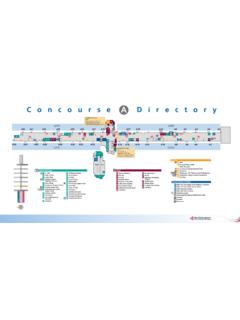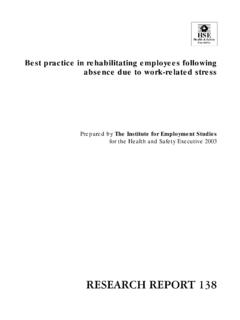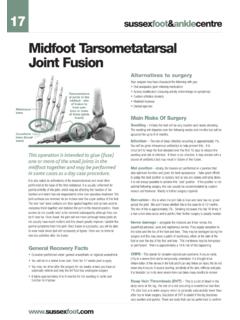Transcription of Resilience Approaches to Supporting Young …
1 Resilience Approaches to Supporting Young people s Mental Health: Appraising the Evidence Base for Schools and Communities 1 Resilience Approaches to Supporting Young people s Mental Health: Appraising the Evidence Base for Schools and Communities Professor Angie Hart and Dr Becky Heaver September 2015 Resilience Approaches to Supporting Young people s Mental Health: Appraising the Evidence Base for Schools and Communities 2 About the AuthorsDr Angie Hart is Professor of Child, Family and Community Health at the University of Brighton. She is also co-founder of the not for profit organisation Boingboing, and acts as its director in a voluntary capacity. Boingboing supports not for profit organisations, practitioners, other adults and Young people to understand and apply Resilience ideas in practice.
2 Angie is a child and family psychotherapist and has worked in child mental health for many years alongside parenting her own three adopted children. She has written books and articles on Resilience Approaches and is especially interested in those which take whole systems, and explicitly social justice, Approaches to developing Resilience . Drawing on academic research, practice and lived experience, Angie co-developed Resilient Therapy and the Academic Resilience Approach which are two of the Approaches included in this guide, both of which are free to use, with materials Supporting their application available to download from: and has tried to be objective and even some might say a bit harsh when evaluating her own Approaches resulting in the kind of acute self-reflection you might find painful to hear about.
3 Despite the brow-beating, she will of course understand if you ignore what she s written about them and do your own investigations. Dr Becky Heaver is Research Officer in the Centre for Health Research at the University of Brighton, and Volunteer Web Admin and Twitterer for Boingboing. Becky enjoys contributing to writing projects such as this and has been working with Angie on Resilience for many years. She prefers to stay indoors on a computer, so you probably won t ever meet her. To cite this report Hart, A. and B. Heaver. 2015 Resilience Approaches to Supporting Young people s Mental Health: Appraising the Evidence Base for Schools and Communities Brighton; University of Brighton/BoingboingAcknowledgements Grateful thanks to Simon Munk, Rachel Roberts, Pauline Wigglesworth and to colleagues at Young Minds, Big Lottery Fund and the Univiersity of Brighton for commenting on a draft of this : Helen Wyatt Approaches to Supporting Young people s Mental Health: Appraising the Evidence Base for Schools and Communities 3 About the Authors 2 Introduction 4 About This Guide 4In a Rush?
4 Go here first 6 What We Were Looking For 6 Programme Details 7a) EIF Rating 7b) Resilience Focus 8c) Key Points of Resilience Building 9d) Country of Origin 10e) Age Range 10f) Costs 10g) Systems Rating 11h) Equalities Rating 12 Resilience Framework 14 Proportionate Universalism 15 Whole Systems and Sustainability 15 What Might a Good Resilience Programme Look Like? 16 Questions to Ask Yourself 17 Now to the 17 Schools-Based Approaches 181) Academic Resilience Approach (ARA) 182) Achievement for All 203) Behaviour Recovery Programme 224) Bounce Back (BB) 245) Circles of Resilience (CoR) 266) CUES-Ed 287) .b [dot-be] Courses from the Mindfulness in Schools Project 308) Emotional First Aid (EFA) 329) FAST (Families And Schools Together) 3410) FRIENDS Programme 3611) Growing Confidence 3912) Health Promoting Schools 4113) Place2be 4314) Promoting Alternative Thinking Strategies (PATHS ) 4515) The Resilience Doughnut (UK) 4716) Rochester Resilience Program (RRP) 5017) Stop Gap Go 5218) SUMO4 Schools 5419) Teens and Toddlers UK 5620) Therapeutic Mentoring 5821) The Thrive Approach 5922) United Kingdom Resilience Programme UKRP/How to Thrive 61 Community-Based Approaches 6423) Action for Happiness 6424) Barnardo s ARCH Project (Achieving Resilience , Change, Hope) 6625)
5 Harlem Children s Zone (HCZ ) 6726) Khazimula 6927) National Citizen Service (NCS) 7128) Pathways to Education 7329) Resilience Builder Program 7530) Resilient Therapy (RT) 7731) Wrap Canada: Canadian High Fidelity Wraparound Model 79 Other programmes 81 General Issues 83 Appendix Summary Table 85 References 88 Feedback Form 96 Contents Resilience Approaches to Supporting Young people s Mental Health: Appraising the Evidence Base for Schools and Communities 4 About This GuideThis guide is designed to help anybody who wants to develop or commission a Resilience program to work across a school or local area to support Young people at risk of developing mental health difficulties.
6 In her role as advisor to the Big Lottery Fund s HeadStart programme in England, Professor Angie Hart developed the methodological approach outlined below based on her academic research, her work as a child mental health practitioner and her lived experience of Supporting children with mental health issues. In addition, the research undertaken and the production of the guide has been supported by the University of Brighton and the Economic and Social Research Council as part of Imagine, an international research project exploring and developing Resilience Approaches to Supporting disadvantaged people . Dr Becky Heaver contributed to researching the different Resilience Approaches , and appraising them for this guide.
7 We hope you will find it to be a user-friendly, useful and transparent overview of what schools, local authorities, teachers, governors or other school staff, parents and even some Young people themselves might want or need to know. The guide should help you think through what s out there in the way of Resilience Approaches for Young people and the pros and cons of adopting particular Approaches for your specific context. Also, we hope the questions and frameworks we have developed to evaluate current Resilience programmes might also help you if you are trying to design your own or are planning to commission a programme that we haven t covered in this guide. Programmes available range from more expensive bespoke facilitated programmes which you buy as a package, to those which just provide the materials and you do the rest yourself.
8 As well as schools-based Approaches , we ve also included a few that are more broadly community-based. These you would need to adopt and adapt to your particular context, but we ve included them because they are good examples of ways to build Resilience with children and Young people . Some programmes are up and running in other regions or countries, and we aren t able to give you every single detail about them. If you are travelling their way, contact them and ask whether you can speak to them about what they have undertaken research into 31 Approaches or programmes in this guide, however, it is certainly not definitive. We have tried to include all the programmes currently being developed or used by 12 local areas as part of the Big Lottery Funded HeadStart programme.
9 HeadStart aims to improve Young people s mental health with local areas taking IntroductionResilience Approaches to Supporting Young people s Mental Health: Appraising the Evidence Base for Schools and Communities 5various different Resilience -based Approaches to tackling the issues. In addition, we have covered all the programmes first identified by the Big Lottery Fund as being of potential interest to HeadStart areas. We have added other programmes (delivered in the English language) to our review that were identified by international academics, charity chief executives and policy makers in a questionnaire we sent as part of our research to experts in the field in 2014 enquiring about Resilience Approaches .
10 Hence not all of the programmes considered in this guide are available in the UK. We have included some programmes that we know to be in existence, simply from working in the field for many years. And finally, we have included a smattering of programmes because their originators became aware of the fact that we were working on these issues, and they contacted us to tell us about what they were doing. We have included any that we feel we can make a reasonable case for them to be understood and articulated as a Resilience -based programme, even if they don t themselves coherently explain their aims in this way. Through our research we evaluated the programmes in relation to some of the core ideas in Resilience theory and practice, we hope we have helped make some explicit links, and also identified gaps in programmes that might be addressed in the future.





